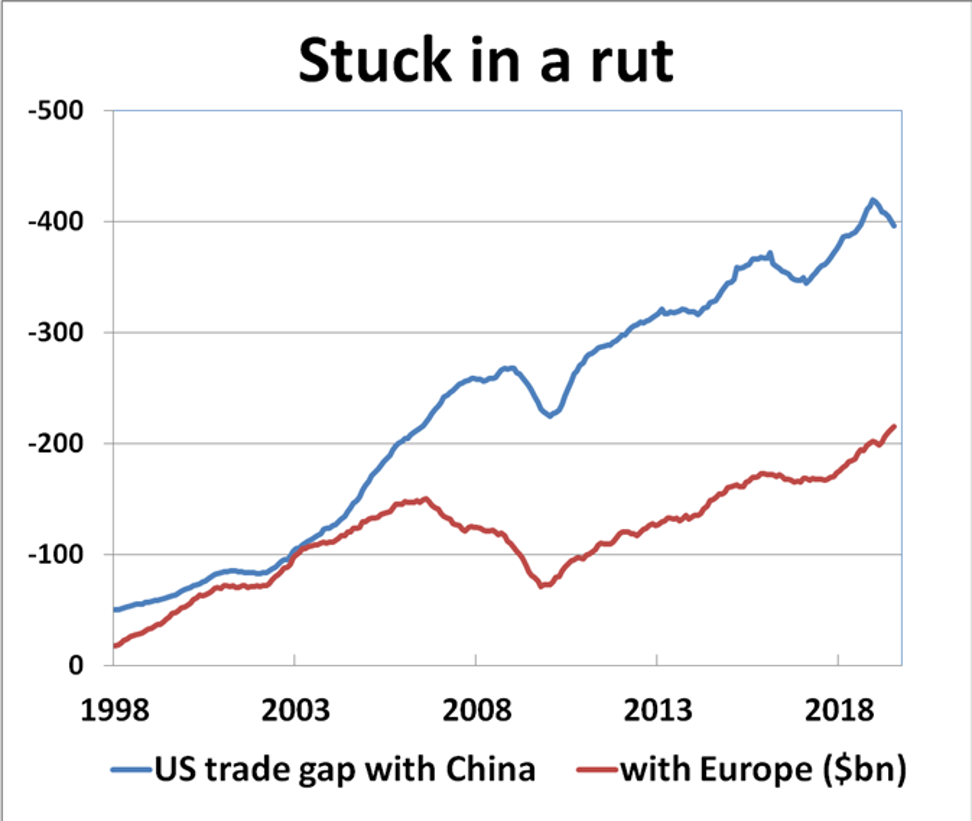
Donald Trump’s trade war can’t solve America’s problems, but it is creating plenty for the global economy
- Since Donald Trump launched his tariff war, US trade and budget deficits have only grown, and now the US economy is slowing
- It would be better to tame runaway US consumerism and start policy coordination with other major powers to stave off a recession

Deepening political divisions and growing fears pose the biggest challenges for the global economy right now. America’s trade war with China and Britain’s Brexit spat with Europe are doing no favours for global growth just when the world economy needs as much goodwill and positive drive as possible.
It’s not just new policy initiatives that are in short supply; a supreme effort is needed from the world’s most powerful nations to work in a better spirit of mutual harmony and trust. It is pointless conjuring up extra stimulus measures while countries remain at odds and unable to sort out the mess.
At the heart of the trade war is the fear of losing out. It is being driven by Washington’s unease about China’s growing domination of global manufacturing, while growing US protectionism is feeding Beijing’s fears about blocked growth opportunities.
US President Donald Trump wants to make America great again but sees globalisation standing in the way. It’s a sobering reminder that the US needs more radical economic restructuring to stay ahead in a fast-changing world. Without a major overhaul, all Trump can do is soften the blow with more tax cuts and increased government spending, placing further strains on the US budget and trade deficits.

The US is stuck in a serious policy rut. For all of Washington’s trade brinkmanship with Beijing over the past few years, it has yielded no positive results. Hopes are high that some progress may emerge from US-China trade talks over the coming weeks, but at what cost so far?
Global trade flows are shrinking, US growth is flattening and world recovery prospects have been seriously dimmed. For all of Trump’s ambitions to decouple from China and pull manufacturing jobs back to the US, it’s a lost cause so far. The White House appears out of its depth, lacking the vision and means to mend the US economy over the long term.
The loss of US production capacity overseas is down to lost decades of policy, benign neglect and underinvestment in domestic industrial infrastructure. Trump fears China getting bigger and better as a global manufacturing force but has little idea how to tackle it.
The juxtaposition between market-driven and centrally planned systems probably goes a long way to explain why China has consistently outperformed on growth for so many years. Pinning its hopes on market forces to intervene leaves the US at a distinct disadvantage. America is falling behind.
The ideal would be for both sides to patch up their differences, learn to adapt and evolve together. Closer policy harmonisation is a must. Globalisation has simply sped up the process of comparative advantage for both countries and it could become a model of mutually assured prosperity and stability.
US exports of aircraft, soybeans, autos and microchips are just as vital to China’s economy as China’s exports of smart phones, electrical and household goods are key to the US, the world’s leading consumer market. It’s the embodiment of how the global trading system ought to run successfully under commonly agreed rules and cooperation.
Neither side should rock the boat. It is pointless for Trump to complain about unfair trading practices, claiming currency manipulation foul play or leaning on US companies to withdraw from doing business with China. Decoupling is not going to solve America’s US$400 billion annual trade deficit with China.
The Euro is dropping against the Dollar “like crazy,” giving them a big export and manufacturing advantage...and the Fed does NOTHING! Our Dollar is now the strongest in history. Sounds good, doesn’t it? Except to those (manufacturers) that make product for sale outside the U.S.
— Donald J. Trump (@realDonaldTrump) August 30, 2019
By decoupling, Trump would only build bigger trade gaps with competitors elsewhere in Asia and Europe. Trump is already grousing about the euro dropping “like crazy” against the dollar. The US must put its own house in order first.
Until America reins in unfettered consumerism and stops excessive domestic demand leaking overseas, it will continue to aid stronger growth abroad rather than at home. Better balanced domestic reflation is an urgent priority for the US, and for China.
The US and China need to build up their domestic recoveries and sort out their external differences for the world’s sake, and soon.
David Brown is the chief executive of New View Economics